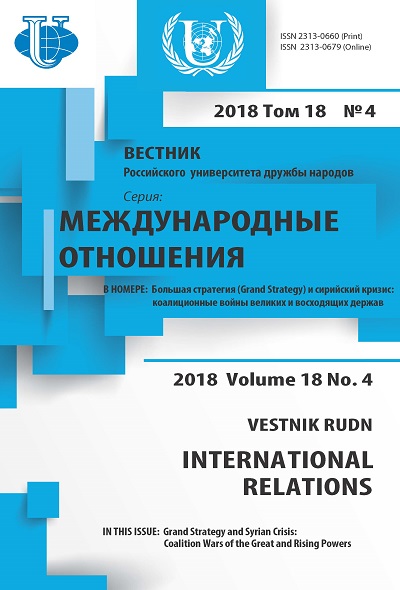Syrian Factor in Russian-US Relations (2011-2018)
- Authors: Kosov A.P.1
-
Affiliations:
- Vitebsk State University named after P.M. Masherov
- Issue: Vol 18, No 4 (2018): Grand Strategy and Syrian Crisis: Coalition Wars of the Great and Rising Powers
- Pages: 775-789
- Section: THEMATIC DOSSIER
- URL: https://journals.rudn.ru/international-relations/article/view/20323
- DOI: https://doi.org/10.22363/2313-0660-2018-18-4-775-789
Cite item
Full Text
Abstract
Russia and the United States, pursuing their national interests in the Middle East, were also involved in the Syrian conflict. As a result, in the second decade of the 21st century, Syria became one of the irritants in Russian-US relations. The protests that began in Syria in 2011 within the framework of “the Arab Spring” led to a serious political confrontation between Assad’s regime and the opposition with the participation of external geopolitical players. Pursuing their national interests in the Middle East Russia and the USA were also involved into the conflict, which made Syria one of the irritators in the Russian-US relations. The purpose of the article is to consider the impact of the Syrian conflict on the evolution of RussianUS relations. Employing general scientific and special historical methods the author uses the mass media materials and the documents published by the governmental and expert structures as well as publications of Russian and Western researchers to explore the impact that the Syrian conflict has on the Russian-US relations. The author analyses the reaction of the US and Russia to the events in Syria and shows their approaches to them. The USA supports the opponents of President B. Assad while the Russian Federation defends the interests of the official Damascus, which made them participants in the Syrian conflict. A conclusion is drawn that the opposing views of Moscow and Washington on the conflict in Syria remains an insurmountable obstacle to the diplomatic settlement of the Syrian issue. Even the common threat from ISIL has not made Russia and the US partners in the Middle East. The author explains this by the fact that the solution to the Syrian conflict has been held hostage to the tense Russian-US relations which have considerably deteriorated since the Ukrainian crisis.
Keywords
About the authors
Alexander Petrovich Kosov
Vitebsk State University named after P.M. Masherov
Author for correspondence.
Email: alekos1979@mail.ru
PhD in History, Associate Professor of the Department of General History and World Culture, Vitebsk State University named after P.M. Masherov
References
- Ashford, E. (2018). How Reflexive Hostility to Russia Harms U.S. Interests. Washington Needs a More Realistic Approach. Foreign Affairs. April 20. URL: https://www.foreignaffairs.com/articles/ russian-federation/2018-04-20/how-reflexive-hostility-russia-harms-us-interests?cid=int-lea& pgtype=hpg (accessed: 08.08.2018).
- Charap, S. & Shapiro, J. (2016). US-Russian Relations: The Middle Cannot Hold. Bulletin of the Atomic Scientists, 72(3), 150—155.
- Charap, S. (2013). Russia, Syria and the Doctrine of Intervention. Survival: Global Politics and Strategy, 55(1), 35—41. doi: 10.1080/00396338.2013.767403
- Goldberg, J. (2016). The Obama Doctrine. The U.S. President Talks through His Hardest Decisions about America’s Role in the World. The Atlantic, April. URL: http://www.theatlantic.com/ magazine/archive/2016/04/the-obamadoctrine/471525/ (accessed: 06.08.2018).
- Indyk, M.S. (2016). The End of the U.S. — Dominated Order in the Middle East. Obama Has Priori¬tized Global Goals over Regional Ones. The Atlantic, March 13. URL: https://www.theatlantic.com/ international/archive/2016/03/obama-middle-east-policy/473529/ (accessed: 07.08.2018).
- Ivanov, I.S. et al. (Eds.). (2017). A Roadmap for U.S. — Russia Relations. Report, 30. Moscow: Russian International Affairs Council. URL: http://russiancouncil.ru/papers/Russia-USA-Roadmap-Report30-En.pdf (accessed: 06.08.2018). (in Russian).
- Katz, M.N. (2013). Russia and the Conflict in Syria: Four Myths. Middle East Policy, XX(2), 38—46. doi: 10.1111/mepo.12018.
- Kortunov, A.V. (Eds.). (2016). The Year in Review. What Changed in 2016 and What to Expect in 2017. Russia Direct Report, 4(12). URL: http://www.russia-direct.org/system/files/journal/ RussiaDirect_Report_TheYearInReview_December2016.pdf (accessed: 08.08.2018).
- Kurginyan, S.E. (Eds.). (2011). Political Tsunami. Event Analysis in North Africa and the Middle East. Moscow: ETC publ. (in Russian).
- Mirzayan, G.V. (2016). East Poker. New Round of the Great Game. Moscow: Eksmo publ. (in Russian).
- Primakov, E.M. (2016). Russia. Hopes and Worries. Moscow: Centrpoligraf publ. (in Russian).
- Shapiro, J. (2017). Russia—US Relations and the Future of Syria. Russia in Global Affairs, September, 12. URL: https://eng.globalaffairs.ru/valday/RussiaUS-Relations-and-the-Future-of-Syria-18987 (accessed: 08.08.2018).
- Shumilin, A.I. (2015). US Policy in the Middle East in the Context of “the Arab Spring”. Moscow: International Relations publ. (in Russian).
- Simes, D.K. & Saunders, P.J. (2015). Obama’s Dangerous “No War, No Peace” Strategy in Syria. The National Interest, October 15. URL: https://nationalinterest.org/print/feature/obama’s-dangerous-no-war-no-peace”-strategy-syria-14092 (accessed: 08.08.2018).
- Stent, A. (2016). Putin’s Power Play in Syria. How to Respond to Russia’s Intervention. Foreign Affairs, 95(1). URL: https://www.foreignaffairs.com/articles/united-states/2015-12-14/putins-power-play-syria (accessed: 08.08.2018).
- Stepanova, E. (2012). The Syrian Crisis and the Formation of Russia’s Foreign Policy. Analytical Note N 199. PONARS Eurasia. May. URL: http://www.ponarseurasia.org/sites/default/files/policy-memos-pdf/pepm199_russ_Stepanova_May2012.pdf (accessed: 25.08.2018). (in Russian).
- Terentiev, A.A. (2012). The Obama Age: Our Interests in the White House. Moscow: Algorithm publ. (in Russian).
- Torkunov, А.V. (2015). What Are We Fighting for in Syria? Russian International Affairs Council. URL: http://russiancouncil.ru/analytics-and-comments/comments/za-chto-my-voyuem-v-sirii/ (accessed: 22.05.2016). (in Russian).
- Zvyagelskaya, I.D. (2014). The Middle East Clinch: Conflicts in the Middle East and Russia’s Policies. Moscow: Aspect-press publ. (in Russian).
- Zvyagelskaya, I.D. (2016). The Illusion of Truce? Russian International Affairs Council, September, 21. URL: http://russiancouncil.ru/analytics-and-comments/analytics/illyuziya-peremiriya/ ?sphrase_id=16566882 (accessed: 08.08.2018). (in Russian).











